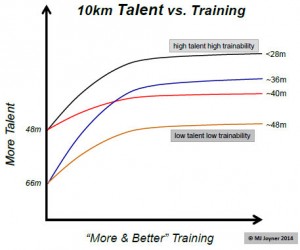I’m a runner–a relatively untalented runner. Yes, I’m 51 years old, so no one expects me to be super fast, but my best time for a mile to date is a rather unimpressive 7:26. I’m pretty sure I’ll never run a four-minute or five-minute mile. I suppose hitting six is possible, but I’m not laying money on it.
In reading about running, which is a great deal less sweat-inducing than actually doing it, I ran into an intriguing study of talent vs. training. This article pointed out–with statistics and graphs, so it must be correct–that no amount of training can take an untalented sprinter and make him or her outperform the talented sprinter. On the other hand, the data shows that an untalented distance runner who trains hard can hope to outperform the talented distance runner who doesn’t train hard. The image looks something like this.
Chart 2 uses the 10k where training will cause bigger relative improvements in performance in both the talented and untalented. The key point is that given enough training the performances of at least some people with “no” talent can sometimes equal or surpass the performances of some talented individuals, especially an untrained or undertrained talented person.
I believe that writers are largely born rather than trained as well. No amount of practice at writing will transform the utterly untalented hack into a National Book Award winner. However, there is hope. Practice can take an “untalented” writer to a level beyond that of the talented writer who doesn’t put the time in. Do I have data to prove that? No, but there is plenty of anecdotal experience to suggest that it is true.
Can you become Hemingway by writing enough? No, but you can probably improve more than Hemingway did with the same amount of experience.

